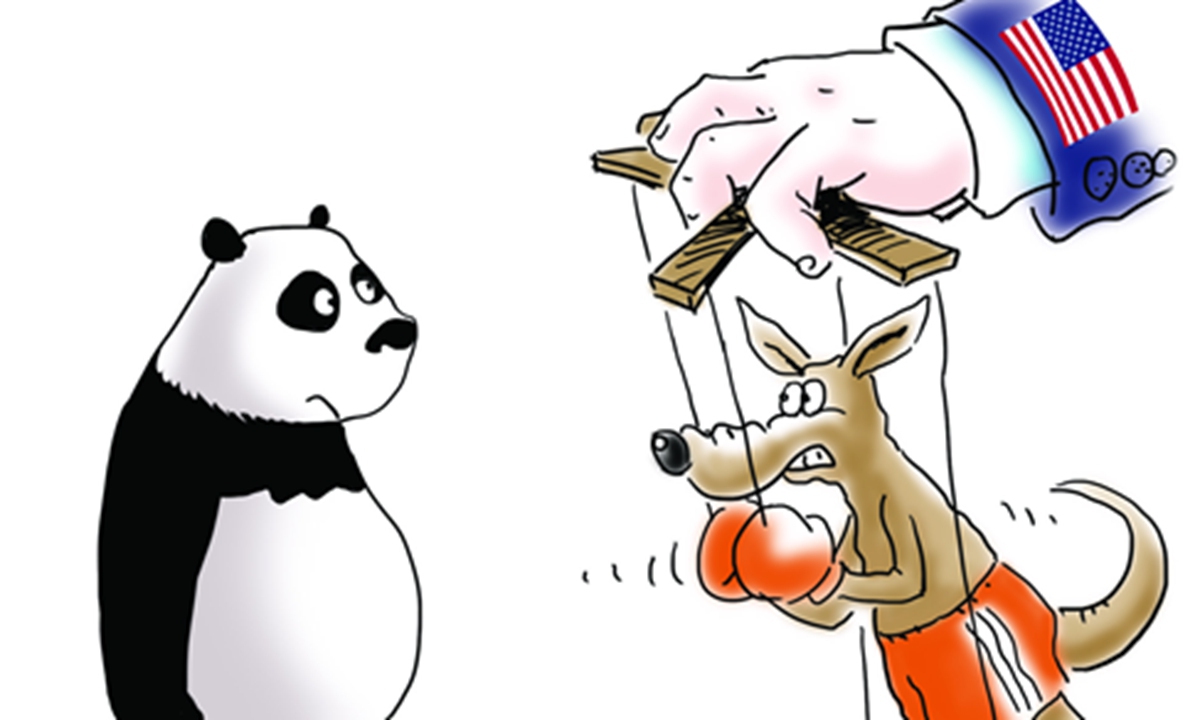
Illustration: Liu Rui/GT
The Australian federal government on Wednesday used a new anti-China law to tear up agreements signed between the state of Victoria and China on the Belt and Road Initiative (BRI), in an unreasonable and deliberate provocation against China.Not surprisingly, the move has drawn the ire of officials in Beijing. On Thursday, a spokesperson for the Chinese Foreign Ministry urged Australia to immediately reverse its wrong decision and stop irresponsible words and deeds regarding the China-Australia relationship, or China will definitely respond "firmly and forcefully."
Canberra must have known or even anticipated that its action would draw such a furious response and potentially crippling countermeasures from Beijing. However, it still decided to move ahead with the action. Clearly, Canberra is increasingly unhinged and in way over its head by taking such a suicidal attack on not just China but also its own economic interests.
Since the cancellation of the BRI deals, speculation has been rife that Canberra may soon suffer from the wrath of its largest trading partner. Given the viciousness and seriousness of the move, we won't be surprised if China takes forceful countermeasures to inflict serious pain on Australia. With China's comprehensive strength, there are numerous ways for China to achieve that. If anyone in Canberra has doubts about that, just take a look at how China beat back US' trade aggressions over the past several years. And keep in mind, Australia is nothing more than a tiny sidekick of the US.
Even though China has not retaliated against the flurry of hostile moves taken by Australia at the behest of the US, many Australia businesses, including winemakers, farmers and seafood exporters, have already suffered due to the downward spiral in bilateral relations.
Just last week, media reports said that Australian businesses are eager to address their trade woes by planning to send a high-level trade mission to China as soon as international travel restrictions are lifted. Perhaps rather than preparing for a trip to China, they should pay more attention to how their government is undercutting them and how it plans to help them, because the door to resolving disputes with China may have been shut by their government for the foreseeable future.
For a long time, China has called on Australia to take concrete actions to rectify its mistakes in order to ease tension between the two countries, but only to see politicians in Canberra pay lip service, while further poisoning bilateral relations with no regard for the consequences for people and businesses of both countries.
By calling all trade disputes with China "economic coercion," Canberra has only fanned the anti-China flame in Australia in dereliction of its responsibility. The recent trade measures China took against Australian products like barley and wine are based on Chinese laws and evidence to protect the Chinese public. Moreover, Australia officials deliberately ignored the fact that it has launched more than 100 anti-dumping and anti-subsidy investigations against Chinese products, while China only initiated four investigations against Australian goods.
With the cancellation of the BRI agreements, Canberra once again laid bare that it has no intention of easing tensions with China; instead, it is further seeking to poison bilateral cooperation with its largest trading partner. That just adds to a long list of hostile actions taken by Australia, which was the first country in the world to ban Huawei's 5G equipment and has shamelessly followed the US in every attempt to smear China over issues related to Hong Kong and Xinjiang, among others.
There is also another critical aspect of Australia's latest action. By unilaterally canceling the agreements, Canberra also sets a bad precedent for BRI cooperation. Other radical anti-China forces may copy such a damaging move to serve their own interests. That is more reason that countermeasures against Australia may be necessary to send an unmistakable signal that ill attempts to undermine win-win cooperation under the BRI won't let go unpunished.
The BRI is a massive economic cooperation plan aimed at improving infrastructure in various countries and regions and benefiting ordinary people. It was in recognition of the huge benefits in terms of infrastructure improvement and local jobs that the Victoria state government signed the BRI agreements in the first place. Now all the cooperative efforts may have been wasted.



